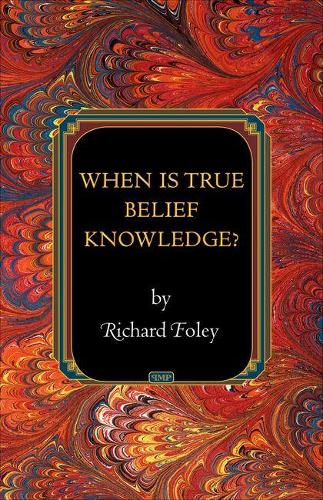
When Is True Belief Knowledge
(Hardback)
Publishing Details
When Is True Belief Knowledge
By (Author) Richard Foley
Princeton University Press
Princeton University Press
2nd October 2012
United States
Classifications
Tertiary Education
Non Fiction
121
Physical Properties
Hardback
168
Width 140mm, Height 216mm
340g
Description
A woman glances at a broken clock and comes to believe it is a quarter past seven. Yet, despite the broken clock, it really does happen to be a quarter past seven. Her belief is true, but it isn't knowledge. This is a classic illustration of a central problem in epistemology: determining what knowledge requires in addition to true belief. In this provocative book, Richard Foley finds a new solution to the problem in the observation that whenever someone has a true belief but not knowledge, there is some significant aspect of the situation about which she lacks true beliefs--something important that she doesn't quite "get." This may seem a modest point but, as Foley shows, it has the potential to reorient the theory of knowledge. Whether a true belief counts as knowledge depends on the importance of the information one does or doesn't have. This means that questions of knowledge cannot be separated from questions about human concerns and values. It also means that, contrary to what is often thought, there is no privileged way of coming to know. Knowledge is a mutt. Proper pedigree is not required. What matters is that one doesn't lack important nearby information. Challenging some of the central assumptions of contemporary epistemology, this is an original and important account of knowledge.
Reviews
"[Foley's] book impressively combines breadth, succinctness, and readability. It will profit both professional philosophers and advanced students in epistemology."--Choice "This book is an illustrative and erudite contribution to the field of epistemology. Foley departs from the typical rational objective and presents an intuitive account of knowledge and true belief."--Diana Karbonowska, European Legacy
Author Bio
Richard Foley is professor of philosophy and vice chancellor for strategic planning at New York University. He is the author of "Intellectual Trust in Oneself and Others," "Working Without a Net: A Study of Egocentric Epistemology," and "The Theory of Epistemic Rationality."
